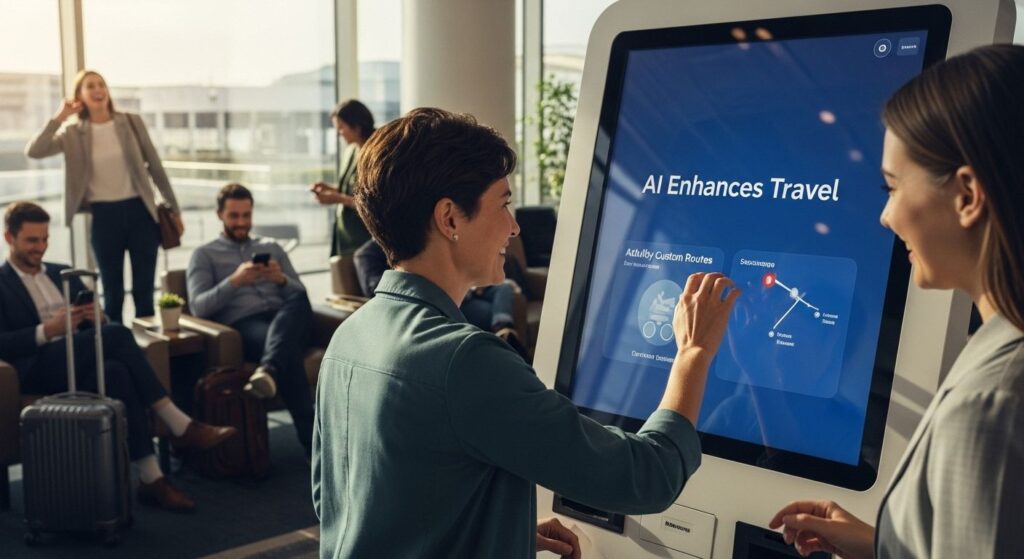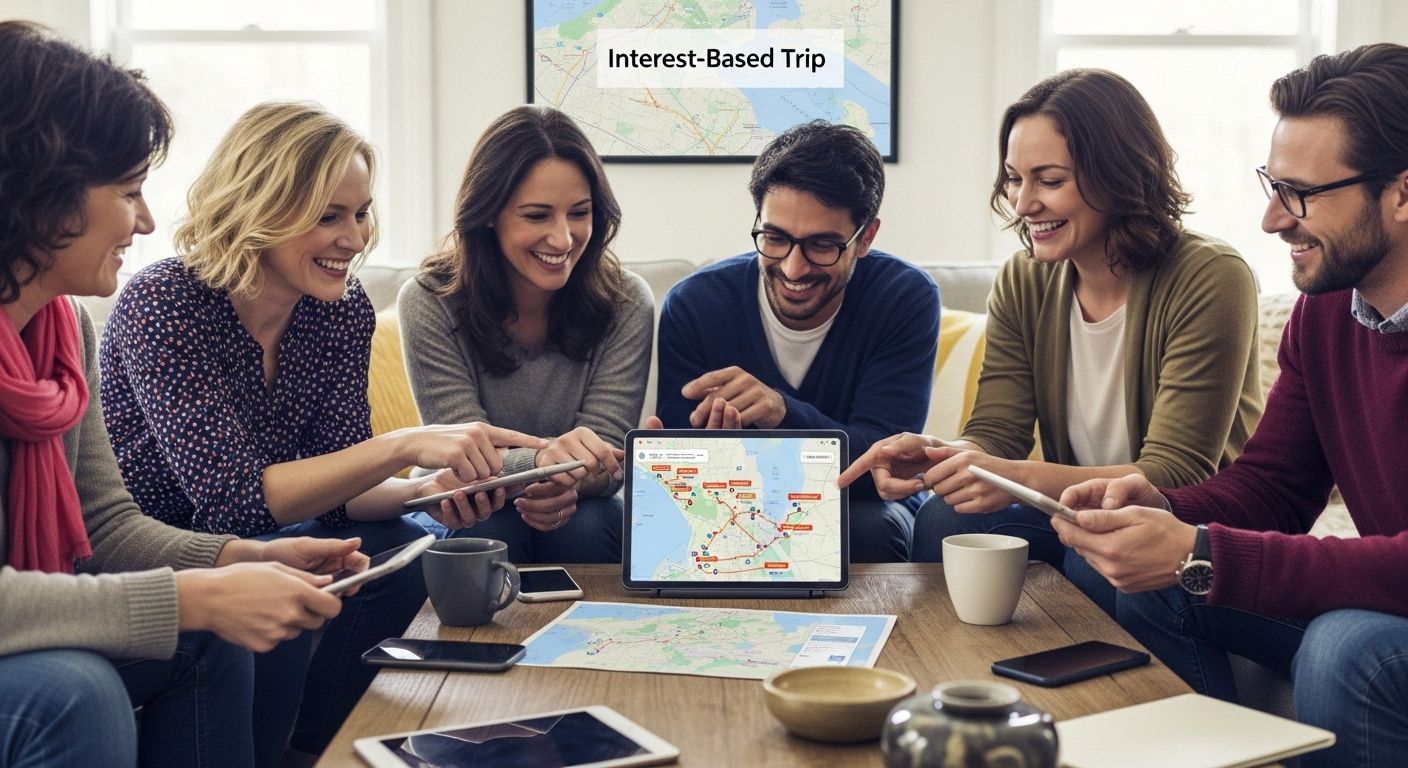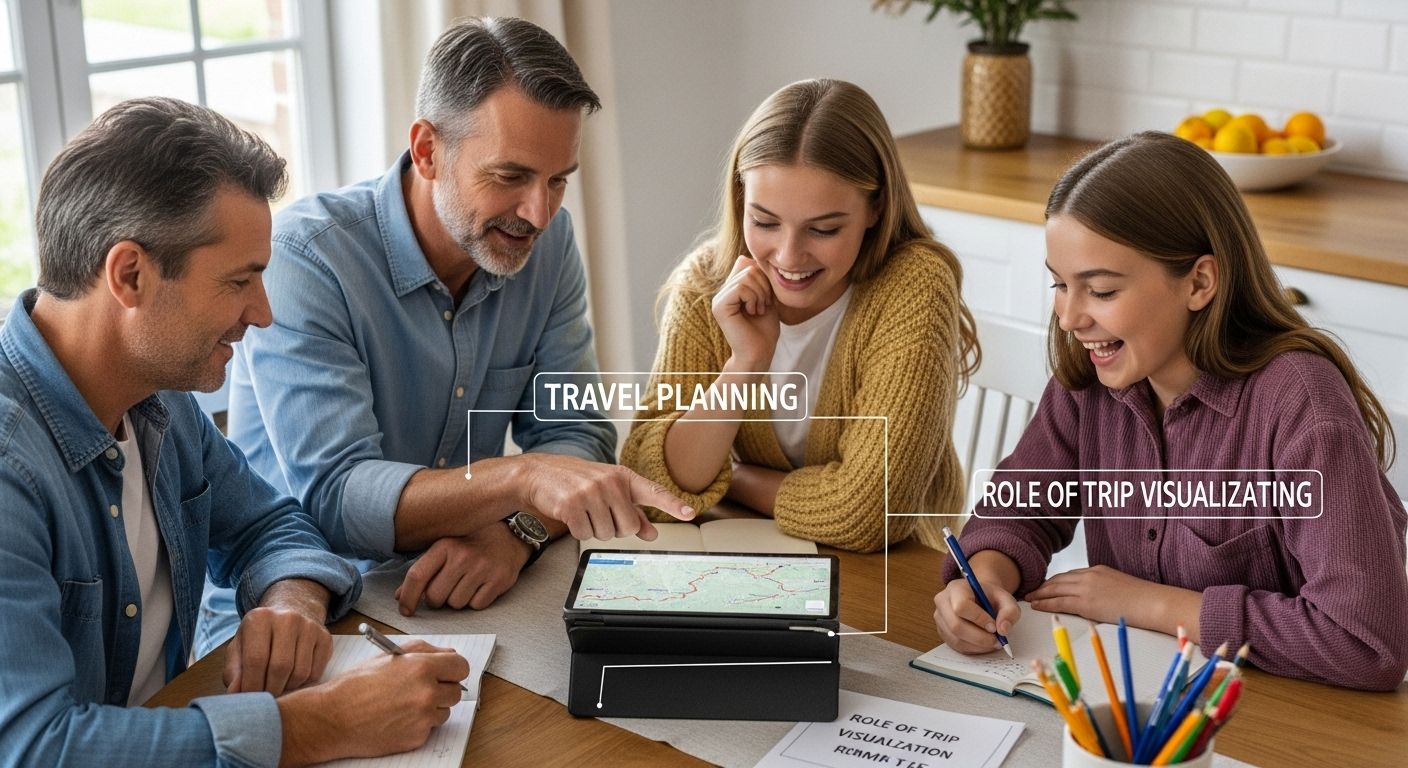Travel planning used to mean endless scrolling and second-guessing every detail. Now AI can tailor your entire trip in seconds, pulling from millions of options to match your unique tastes. Here’s the kicker. AI-driven recommendation systems can boost travel satisfaction by up to 40 percent through precise personalization. So why are so many travelers still missing out on these smarter, easier trip planning tools?
Table of Contents
- How Ai Enhances Travel Planning Experiences
- Understanding Personalization In Ai Travel Tools
- The Impact Of Ai On Travel Recommendations
- Exploring Ai’s Role In Itinerary Optimization
- The Future Of Ai In Travel Planning
Quick Summary
| Takeaway | Explanation |
|---|---|
| AI offers personalized travel recommendations | AI systems analyze user data to suggest tailored destinations and activities based on individual preferences and budget. |
| Travel planning efficiency is enhanced by AI | AI can optimize itineraries, creating efficient routes that minimize complications and maximize enjoyment during trips. |
| Contextual recommendations adapt in real-time | AI tools adjust suggestions based on current conditions, such as location, weather, and local events, ensuring relevance. |
| AI learns and evolves traveler profiles | Intelligent systems track user behavior over time to create dynamic profiles that lead to increasingly precise recommendations. |
| Ethical considerations in AI travel tools are crucial | As AI technology develops, ensuring data privacy and user control becomes essential to maintaining trust in travel planning. |
How AI Enhances Travel Planning Experiences
Artificial intelligence is revolutionizing how travelers prepare and optimize their journeys, transforming traditional trip planning into a seamless, personalized experience. By leveraging advanced algorithms and machine learning technologies, AI enables travelers to create more intelligent, efficient, and tailored travel strategies.
Personalized Recommendation Systems
AI platforms analyze vast amounts of user data, including previous travel history, preferences, budget constraints, and interests to generate highly customized travel recommendations. These intelligent systems can suggest destinations, accommodations, activities, and routes that precisely match individual traveler profiles. Research from the National Science Foundation indicates that AI-driven recommendation systems can increase travel satisfaction by up to 40% through precise personalization.
Key benefits of AI personalization include:
- Discovering hidden travel gems aligned with personal interests
- Reducing time spent on manual research
- Providing context-aware suggestions based on real-time data
Intelligent Itinerary Optimization
Beyond recommendations, AI excels at creating optimized travel plans that maximize efficiency and minimize potential complications. These systems can automatically calculate optimal routes, balance travel times, suggest cost-effective transportation options, and even predict potential travel disruptions. Modern AI algorithms consider multiple variables simultaneously, creating itineraries that human planners might overlook.
For travelers seeking a more streamlined planning process, learn more about our AI-powered trip planning strategies, which can transform how you approach travel preparation. By integrating complex data analysis with user-friendly interfaces, AI makes sophisticated travel planning accessible to everyone.
Understanding Personalization in AI Travel Tools
Personalization in AI travel tools represents a sophisticated approach to creating tailored travel experiences by leveraging advanced data analysis and machine learning technologies. These intelligent systems go beyond traditional one-size-fits-all travel recommendations by understanding individual traveler preferences, behaviors, and unique requirements.
Data-Driven Personal Profiling
AI travel tools construct comprehensive traveler profiles by aggregating and analyzing multiple data points. These include browsing history, past travel experiences, social media interactions, demographic information, and real-time preferences. According to the World Economic Forum, this granular approach allows AI systems to develop nuanced understanding of traveler characteristics that traditional booking platforms cannot match.
Key elements of AI-powered personal profiling include:
- Tracking individual travel preferences and patterns
- Analyzing historical booking and interaction data
- Integrating contextual information like budget constraints
- Understanding subtle preference indicators
Contextual Recommendation Engines
Advanced AI recommendation engines dynamically adjust suggestions based on real-time context. These systems consider multiple variables simultaneously, such as current location, seasonal trends, local events, weather conditions, and personal interests. By processing complex datasets instantaneously, AI tools can generate highly precise travel recommendations that feel intuitively aligned with individual traveler needs.
Check out our guide on crafting personalized travel experiences to understand how AI transforms the traditional approach to trip planning. The future of travel lies in technologies that understand travelers not just as customers, but as unique individuals with distinctive preferences and expectations.
The Impact of AI on Travel Recommendations
Artificial intelligence has fundamentally transformed how travelers discover, evaluate, and select travel experiences. By leveraging sophisticated algorithms and machine learning technologies, AI recommendation systems have evolved from simple suggestion engines to intelligent, context-aware platforms that understand nuanced traveler preferences.

Beyond Traditional Recommendation Models
Traditional travel recommendation systems relied on basic filtering and matching techniques that often produced generic suggestions. Modern AI-powered platforms employ advanced predictive analytics that consider multiple complex variables simultaneously. According to the World Economic Forum, these intelligent systems analyze an unprecedented range of data points to generate hyper-personalized recommendations.
Key improvements in AI recommendation technologies include:
- Real-time adaptation to changing user preferences
- Contextual understanding beyond surface-level data
- Predictive analysis of potential traveler interests
- Integration of multiple data sources for comprehensive insights
Precision and Personalization in Travel Suggestions
AI recommendation engines now function as sophisticated digital travel companions. They can anticipate traveler needs by examining intricate patterns in user behavior, historical travel data, social media interactions, and even emotional sentiment analysis. These systems create dynamic traveler profiles that evolve with each interaction, enabling increasingly accurate and meaningful travel suggestions.
Below is a comparison table that organizes the key differences between traditional and AI-powered travel recommendation systems, as discussed in the article.
| Feature | Traditional Recommendations | AI-Powered Recommendations |
|---|---|---|
| Personalization Level | Generic, often one-size-fits-all | Highly tailored to individual users |
| Data Considered | Limited (basic filters and matching) | Extensive (user behavior, preferences, real-time context) |
| Adaptability | Static, rarely adapts to changes | Dynamic, adapts in real time |
| Prediction Capabilities | Minimal | Predictive analytics for user needs |
| Integration of Contextual Factors | Low | High (weather, events, location, etc.) |
| Accuracy of Recommendations | Moderate | High (up to 40% increased satisfaction) |
| Evolution Over Time | Stays mostly the same | Learns and improves with each use |
Discover more about optimizing AI-driven travel planning and unlock a new era of personalized travel experiences. The future of travel recommendations lies in technologies that don’t just suggest destinations, but truly understand individual traveler aspirations.
Exploring AI’s Role in Itinerary Optimization
Itinerary optimization represents a cutting-edge application of artificial intelligence that transforms traditional travel planning into a highly intelligent, adaptive process. By leveraging advanced computational techniques, AI systems can design travel routes that maximize efficiency, comfort, and personal satisfaction in ways human planners cannot easily replicate.
Advanced Route and Time Management
AI-powered itinerary optimization goes far beyond simple route calculations. These sophisticated systems analyze complex variables such as travel time, transportation modes, location proximity, individual preferences, budget constraints, and real-time environmental factors. According to research published in the National Center for Biotechnology Information, these algorithms can generate travel plans that minimize unnecessary travel, reduce overall expenses, and create more enjoyable experiences.
Key capabilities of AI itinerary optimization include:
- Dynamic route recalculation based on current conditions
- Intelligent sequencing of attractions and activities
- Consideration of personal energy levels and travel fatigue
- Real-time adjustment for unexpected disruptions
Predictive Travel Experience Design
Modern AI systems do not just plan routes they anticipate traveler needs. By analyzing historical travel data, user behavior patterns, and contextual information, these intelligent platforms can predict potential challenges and proactively suggest alternatives. The technology understands that an optimal itinerary is not just about geographical efficiency, but about creating a holistic, stress-free travel experience.
Explore our comprehensive guide to AI-powered trip planning and discover how technology is revolutionizing the way we approach travel. The future of trip planning lies in systems that understand travel is not just about destinations, but about crafting personalized journeys that resonate with individual aspirations.
The following table summarizes the main capabilities and benefits of AI-powered itinerary optimization mentioned in the article.
| Capability | Explanation |
|---|---|
| Dynamic Route Recalculation | Adjusts routes in real time based on current conditions |
| Intelligent Sequencing of Activities | Orders attractions and activities for optimal experience |
| Personalization by Preferences | Considers traveler interests, energy levels, and budget |
| Prediction of Disruptions | Identifies and adapts to potential travel interruptions |
| Cost Efficiency | Suggests options to minimize unnecessary spending |
| Time Management | Optimizes travel time and minimizes wasted hours |
| Enhanced Enjoyment | Designs holistic plans for greater comfort and satisfaction |

The Future of AI in Travel Planning
Artificial intelligence is poised to fundamentally reshape the travel planning landscape, transforming how travelers conceptualize, research, and experience their journeys. As technology continues to evolve, AI will transition from a supplementary tool to an essential, intelligent travel companion that anticipates and fulfills traveler needs with unprecedented precision.
Emerging Technological Frontiers
The next generation of AI travel planning will leverage advanced machine learning models that integrate multiple data streams to create hyper-personalized travel experiences. According to the World Economic Forum, these technologies will go beyond traditional recommendation systems, incorporating sophisticated predictive analytics that understand travelers at a deeply individual level.
Key technological innovations on the horizon include:
- Emotional sentiment analysis for tailored recommendations
- Integrated augmented reality travel guidance
- Predictive disruption management
- Seamless multilingual communication interfaces
Ethical and Experiential Considerations
As AI becomes more integrated into travel planning, critical considerations around data privacy, algorithmic transparency, and user control will emerge. Future AI systems must balance technological sophistication with ethical design, ensuring travelers maintain agency in their planning process. The goal is not to replace human decision making, but to augment and enhance travel experiences through intelligent, responsive technologies.
Learn more about navigating the future of AI-powered travel and discover how emerging technologies are redefining the boundaries of personalized travel. The future of trip planning is not just about destinations, but about creating meaningful, seamlessly tailored journeys that adapt and respond to individual traveler needs.
Unlock Seamless AI Trip Planning with Yopki
You just learned how artificial intelligence can make itinerary building smarter and more personal. If you ever feel overwhelmed by endless travel research or frustrated with tools that cannot understand your unique travel style, you are not alone. The article highlighted big pain points like time-consuming trip planning, lack of true personalization, and the stress of managing multiple travel details. Yopki solves these exact challenges with an all-in-one platform that puts the power of AI personalization in your hands.

Imagine trading stressful spreadsheets for a single web app that instantly creates your perfect itinerary based on your interests and helps you organize every day visually on a smart map. Your personal AI Travel Concierge is always available to answer trip-related questions or make real-time changes to your plans. Best of all, everything is kept in one place and ready for you to access anytime. Discover how easy travel planning can be with Yopki’s smart itinerary builder. Stop letting travel stress hold you back. Visit Yopki today to experience effortless, AI-powered trip organization and start planning your next adventure with confidence.
Frequently Asked Questions
How does AI personalize travel planning?
AI personalizes travel planning by analyzing vast amounts of user data, including travel preferences, budgets, and history, to generate customized recommendations for destinations, accommodations, and activities.
What are the benefits of using AI for itinerary optimization?
AI optimization can create more efficient travel plans by calculating the best routes, suggesting cost-effective transportation, and predicting potential disruptions, leading to a smoother travel experience.
How does AI improve travel recommendations?
AI improves travel recommendations by utilizing advanced predictive analytics that consider multiple variables, allowing for more context-aware and personalized suggestions compared to traditional recommendation systems.
What future advancements can we expect in AI travel planning?
Future advancements in AI travel planning may include emotional sentiment analysis, augmented reality guidance, and predictive disruption management, enhancing the personalization and efficiency of travel experiences.



